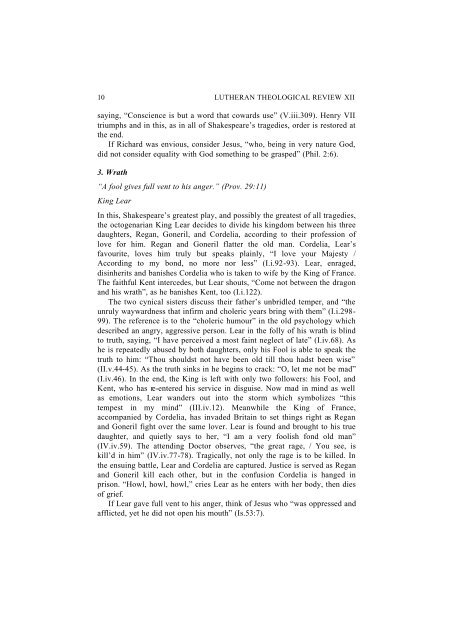LUTHERAN THEOLOGICAL REVIEW - Concordia Lutheran Seminary
LUTHERAN THEOLOGICAL REVIEW - Concordia Lutheran Seminary
LUTHERAN THEOLOGICAL REVIEW - Concordia Lutheran Seminary
You also want an ePaper? Increase the reach of your titles
YUMPU automatically turns print PDFs into web optimized ePapers that Google loves.
10 <strong>LUTHERAN</strong> <strong>THEOLOGICAL</strong> <strong>REVIEW</strong> XII<br />
saying, “Conscience is but a word that cowards use” (V.iii.309). Henry VII<br />
triumphs and in this, as in all of Shakespeare’s tragedies, order is restored at<br />
the end.<br />
If Richard was envious, consider Jesus, “who, being in very nature God,<br />
did not consider equality with God something to be grasped” (Phil. 2:6).<br />
3. Wrath<br />
“A fool gives full vent to his anger.” (Prov. 29:11)<br />
King Lear<br />
In this, Shakespeare’s greatest play, and possibly the greatest of all tragedies,<br />
the octogenarian King Lear decides to divide his kingdom between his three<br />
daughters, Regan, Goneril, and Cordelia, according to their profession of<br />
love for him. Regan and Goneril flatter the old man. Cordelia, Lear’s<br />
favourite, loves him truly but speaks plainly, “I love your Majesty /<br />
According to my bond, no more nor less” (I.i.92-93). Lear, enraged,<br />
disinherits and banishes Cordelia who is taken to wife by the King of France.<br />
The faithful Kent intercedes, but Lear shouts, “Come not between the dragon<br />
and his wrath”, as he banishes Kent, too (I.i.122).<br />
The two cynical sisters discuss their father’s unbridled temper, and “the<br />
unruly waywardness that infirm and choleric years bring with them” (I.i.298-<br />
99). The reference is to the “choleric humour” in the old psychology which<br />
described an angry, aggressive person. Lear in the folly of his wrath is blind<br />
to truth, saying, “I have perceived a most faint neglect of late” (I.iv.68). As<br />
he is repeatedly abused by both daughters, only his Fool is able to speak the<br />
truth to him: “Thou shouldst not have been old till thou hadst been wise”<br />
(II.v.44-45). As the truth sinks in he begins to crack: “O, let me not be mad”<br />
(I.iv.46). In the end, the King is left with only two followers: his Fool, and<br />
Kent, who has re-entered his service in disguise. Now mad in mind as well<br />
as emotions, Lear wanders out into the storm which symbolizes “this<br />
tempest in my mind” (III.iv.12). Meanwhile the King of France,<br />
accompanied by Cordelia, has invaded Britain to set things right as Regan<br />
and Goneril fight over the same lover. Lear is found and brought to his true<br />
daughter, and quietly says to her, “I am a very foolish fond old man”<br />
(IV.iv.59). The attending Doctor observes, “the great rage, / You see, is<br />
kill’d in him” (IV.iv.77-78). Tragically, not only the rage is to be killed. In<br />
the ensuing battle, Lear and Cordelia are captured. Justice is served as Regan<br />
and Goneril kill each other, but in the confusion Cordelia is hanged in<br />
prison. “Howl, howl, howl,” cries Lear as he enters with her body, then dies<br />
of grief.<br />
If Lear gave full vent to his anger, think of Jesus who “was oppressed and<br />
afflicted, yet he did not open his mouth” (Is.53:7).













